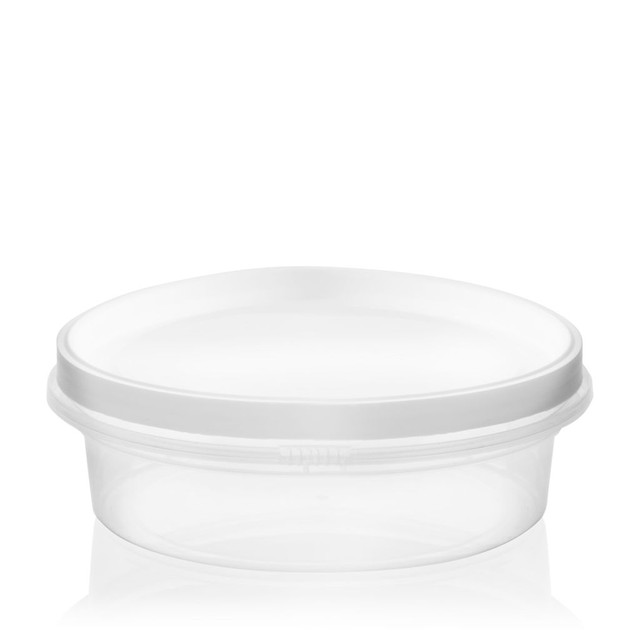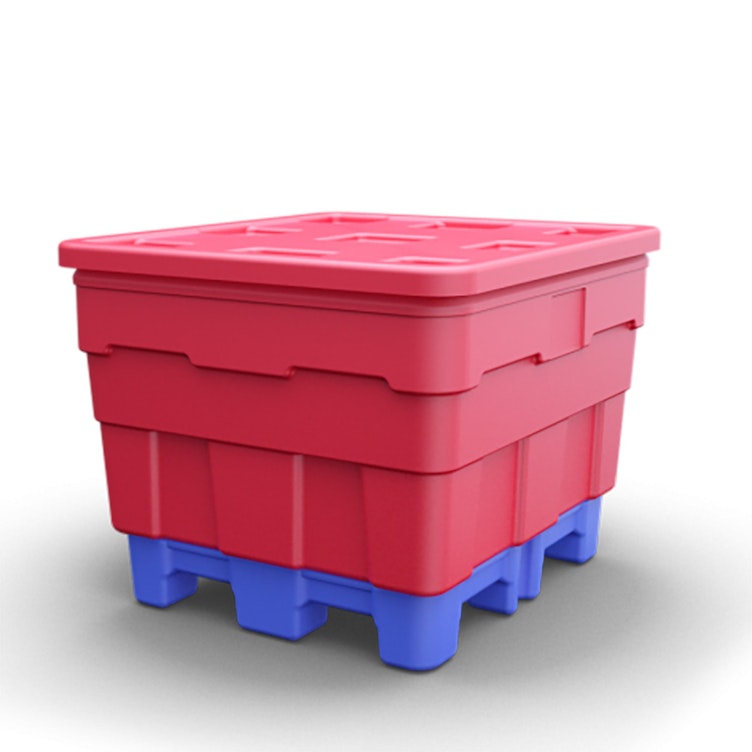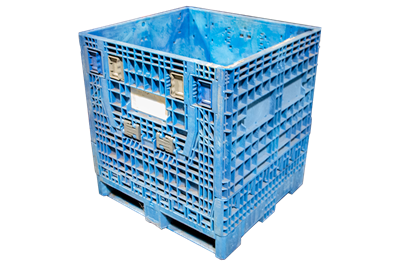A Comprehensive Overview to the Various Types of Bulk Plastic Containers Available Today
Mass plastic containers play a critical role in various industries, providing options for storage space and transport. Their diverse kinds cater to different requirements, from stiff choices for solid products to adaptable containers suiting numerous forms. Each type offers unique benefits, making it vital to comprehend their attributes and applications. As industries develop, so do the needs for reliable container solutions. What elements should one take into consideration when choosing the appropriate bulk container?
Introduction of Bulk Plastic Containers

Sorts Of Mass Plastic Containers
Bulk plastic containers can be found in numerous types, each matched to particular applications. Inflexible bulk containers, adaptable bulk containers, and intermediate bulk containers represent the main categories, each offering unique advantages. Comprehending these kinds is important for selecting the ideal container for carrying and storing materials.

Rigid Bulk Containers
Inflexible bulk containers are vital for reliable storage space and transport of different products throughout sectors. These containers are generally constructed from durable plastics, enabling them to stand up to severe handling and ecological conditions. They are available in different forms and sizes, consisting of containers, totes, and drums, making them appropriate for saving every little thing from granular substances to fluids. Stiff containers commonly include strengthened wall surfaces and protected lids, making sure the contents continue to be secured during transit. Their stackable layout maximizes storage room, making them perfect for stockrooms and making facilities. In addition, several rigid mass containers are recyclable and recyclable, adding to sustainability initiatives. Overall, their effectiveness and flexibility make inflexible bulk containers an important component in supply chain operations.
Flexible Mass Containers
Flexible mass containers, often described as flexible intermediate bulk containers (FIBCs), serve as a versatile solution for transferring and storing a selection of completely dry materials. These containers are normally made from woven polypropylene and are created to be light-weight yet strong, permitting for effective handling and piling. Their flexibility enables them to suit various sizes and shapes, making them appropriate for products ranging from grains to chemicals. FIBCs can be outfitted with functions such as spouts for easy filling and discharge, as well as protective finishes for boosted toughness. Furthermore, they are recyclable and recyclable, contributing to lasting practices in markets such as agriculture, food processing, and construction. In general, versatile bulk containers provide a cost-efficient and efficient option for mass product monitoring.
Intermediate Bulk Containers
Intermediate bulk containers (IBCs) are vital for the reliable transport and storage space of fluids and granular materials across various markets. These containers commonly have a capability varying from 275 to 330 gallons and are developed for very easy piling and handling. Made from resilient materials like high-density polyethylene or steel, IBCs provide excellent defense versus contamination and environmental variables. Their style consists of features such as a built-in pallet for forklift access and a removable top for easy filling and cleaning. IBCs are commonly used in chemical, food, and pharmaceutical sectors, making certain conformity with security policies. Their versatility and reusability make them an affordable solution for mass storage space and transportation, contributing to supply chain efficiency and sustainability.
Features and Benefits of Bulk Plastic Containers
Bulk plastic containers are vital devices in numerous sectors, providing a combination of durability and practicality. These containers are constructed from high-grade products, making them resistant to influences, chemicals, and environmental elements. This effectiveness warranties product security throughout storage space and transportation.
In addition, mass plastic containers are light-weight, facilitating ease of reducing and handling delivery expenses. Their stackable style optimizes storage space effectiveness, enabling optimized warehouse space. Lots of designs feature protected lids or closures, offering a closed seal that prevents and preserves materials contamination.
Mass plastic containers are usually reusable and recyclable, adding to lasting methods. Their adaptability allows for a vast array of applications, from food storage to industrial usage, enhancing their value throughout industries. Businesses gain from the long life expectancy and low upkeep needs of these containers, making them an affordable solution for both short-term and long-term needs.
Industries That Make Use Of Mass Plastic Containers
Numerous sectors take advantage of the usage of bulk plastic containers, each leveraging their one-of-a-kind buildings for details applications. The food and beverage industry relies upon these containers for secure storage and transport of products, while the chemical manufacturing industry utilizes them for managing unsafe materials. Furthermore, the pharmaceutical circulation requires highlight the significance of durability and tidiness in packaging services.
Food and Beverage Market
As the need for secure and efficient storage options proceeds to climb, the food and drink sector increasingly relies on bulk plastic containers for their functional demands. These containers give durable, light-weight, and functional alternatives for saving components, finished items, and waste materials. Made from food-grade products, right here they ensure conformity with health and wellness and security standards. Numerous designs, such as stackable containers and tote boxes, optimize room throughout transportation and storage, enhancing logistical performance. Furthermore, the openness of some mass containers permits very easy inventory administration, reducing the danger of spoilage. With the market's concentrate on sustainability, numerous manufacturers are currently providing reusable and recyclable alternatives, straightening with eco-friendly practices while meeting the high needs of food safety and security and hygiene.
Chemical Production Market
The chemical manufacturing industry counts greatly on mass plastic containers for the reliable and risk-free storage space of raw materials, intermediates, and completed products. These containers are created to endure numerous chemicals, guaranteeing that harmful products do not leak or break down the container itself. Common kinds include high-density polyethylene (HDPE) and polypropylene containers, which use excellent chemical resistance and durability. Their light-weight nature and stackable layout help with transport and storage, maximizing area in manufacturing facilities. In addition, numerous bulk plastic containers feature features such as tamper-evident seals and easy-to-read labeling, improving safety and compliance with market guidelines. Overall, bulk plastic containers are essential to the chemical production procedure, providing dependable options for taking you could check here care of varied substances.
Pharmaceutical Distribution Requirements
Pharmaceutical circulation counts on bulk plastic containers to fulfill rigid safety and security and regulatory requirements. These containers are vital for storing a range and delivering of pharmaceutical items, find more information consisting of active pharmaceutical components (APIs) and completed medications. Their design warranties security versus wetness, contamination, and light, maintaining the integrity of delicate products. Furthermore, mass plastic containers are certified with sector requirements such as Great Manufacturing Practices (GMP) and are frequently made from materials that are FDA-approved. The usage of these containers enhances efficiency in the supply chain, allowing for secure, large-scale circulation while lessening waste. Business in the pharmaceutical sector focus on using durable, watertight, and tamper-evident containers to guarantee item safety and high quality throughout the logistics procedure.
Considerations for Picking the Right Container
When choosing the ideal mass plastic container, various variables have to be very carefully considered to ensure perfect capability and safety and security. The nature of the materials to be saved is vital; compatibility with the container's material can influence integrity and safety and security. plastic bulk containers. Additionally, the container's dimension and shape need to align with the storage and transport requirements, ensuring efficient room usage
Lots capacity is an additional important factor to consider, as it ought to suit the weight of materials without danger of damages or failure. The layout features, such as venting or lids, can impact functionality and access. Compliance with industry laws is necessary, particularly in markets like pharmaceuticals, where security requirements are rigid.
Lastly, the anticipated life expectancy and sturdiness of the container need to be analyzed to verify it meets the functional demands without frequent substitute. By evaluating these factors, one can select the most appropriate mass plastic container for details applications.
Ecological Influence and Sustainability
As businesses increasingly prioritize sustainability, the environmental effect of bulk plastic containers has actually come under scrutiny. These containers, usually made from products such as polyethylene or polypropylene, contribute substantially to plastic waste otherwise handled correctly. Their production includes the usage of nonrenewable fuel sources, which can lead to increased greenhouse gas emissions. Improvements in recycling technology and the advancement of biodegradable alternatives are aiding to minimize these issues.
Additionally, lots of producers are adopting techniques that stress the usage of recycled products, thereby minimizing the demand for virgin plastics. The sturdiness of mass plastic containers also contributes; they are made to be recycled multiple times, which can decrease their overall ecological footprint when contrasted to single-use options. Inevitably, the market encounters the challenge of stabilizing capability with environmental obligation, making sustainable practices essential for the future of mass plastic containers.
Finest Practices for Storage and Transport
Effective storage space and transport of mass plastic containers significantly affect both operational performance and sustainability. To maximize room, organizations need to stack containers firmly, guaranteeing stability and preventing damages. Proper labeling is necessary for simple identification, which streamlines retrieval procedures. Furthermore, preserving a tidy and well organized storage location lowers the risk of contamination and boosts safety.
For transportation, selecting the best lorry is essential; containers must be secured to prevent changing during transit. Firms need to also think about utilizing pallets to promote easier loading and dumping. Normal evaluations of containers for damage can avoid expensive substitutes.
Temperature control is another essential element, as severe problems can jeopardize the stability of the plastic. Training workers on finest practices for managing and transportation assurances compliance and promotes a culture of safety. By carrying out these finest methods, businesses can boost their operational efficiency while adding to ecological sustainability.
Often Asked Inquiries
Exactly how Do I Tidy Mass Plastic Containers Efficiently?
To clean bulk plastic containers properly, one need to rinse them with cozy water, utilize a moderate detergent and scrub with a soft brush. Rinse extensively, then allow to air completely dry entirely before storage or reuse.
What Is the Lifespan of Mass Plastic Containers?
The life expectancy of bulk plastic containers commonly ranges from 5 to 10 years, relying on the product, usage, and ecological problems. Proper maintenance and storage space can greatly prolong their usability and longevity gradually.
Can Mass Plastic Containers Be Personalized?

Do Bulk Plastic Containers Have Service Warranty Options?

Are There Regulations for Using Mass Plastic Containers?
Yes, policies exist for using bulk plastic containers, mostly concentrated on security, environmental impact, and product conformity. These laws ensure that containers satisfy industry standards and appropriate for transferring various compounds safely and efficiently.
Stiff bulk containers, adaptable mass containers, and intermediate bulk containers represent the main classifications, each offering one-of-a-kind benefits. Adaptable bulk containers, typically referred to as versatile intermediate bulk containers (FIBCs), serve as a versatile solution for transporting and storing a variety of completely dry products. The chemical manufacturing sector counts greatly on bulk plastic containers for the safe and efficient storage of raw materials, intermediates, and finished products. plastic bulk containers. These containers are created to endure various chemicals, making certain that unsafe products do not leak or deteriorate the container itself. Additionally, bulk plastic containers are certified with sector criteria such as Great Production Practices (GMP) and are commonly made from materials that are FDA-approved